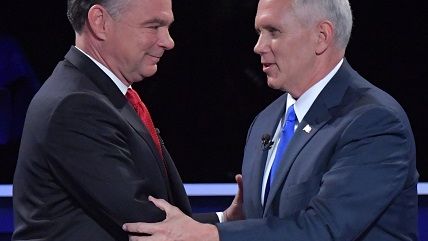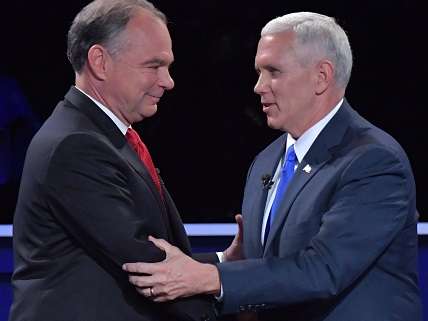Tim Kaine Ends Discussion on Criminal Justice Reform By Shifting to Complaints About Trump Insults
So it goes.


The vice presidential debate, the only one of the campaign season, touched for a few minutes on the issue of criminal justice reform and police violence, but after first moving the conversation to mass shootings and gun control, Democratic vice presidential nominee Virginia Sen. Tim Kaine ended the discussion by shifting to insults made by Donald Trump as an issue of "respect."
Debate moderator asked the vice presidential candidates whether the Americans asked "too much of police officers in this country," as the police chief in Dallas, Dave Brown, suggested after five police officers were killed and several others injured by sniper fire at a Black Lives Matter rally.
Kaine responded by bringing up his time in local government in Richmond, Virginia, where served first as a city councilman in the 1990s and then as mayor from 1998 to 2001. "We had one of the highest homicide rates in the United States," Kaine explained. "We fought very, very hard over the course of my time in local office with our police department, and we reduced our homicide rate nearly in half."
The reduction in Richmond tracked with a national trend of declining homicide and broader crime rates that countless politicians have tried to credit to their own policy preferences despite the lack of convincing evidence.
Kaine moved from tut-tutting the drop in the homicide to a brief comment about "community policing" (later, Republican vice presidential nominee Indiana Gov. Mike Pence, "at the risk of agreeing with" Kaine, called community policing a "great idea" as well) before going on an aside about mass shootings and gun violence, mentioning the Virginia Tech shooting, which happened while he was governor of Virginia.
The transition should not have been surprising. One program Kaine pushed as mayor of Richmond was "Project Exile," which turned gun crimes into federal offenses, sending mostly young black men to federal prisons far from their communities for longer terms. "Project Exile broke black families," Nicole Lee told Reuters after Kaine was announced as Clinton's vice presidential pick. "This is not a benign thing to be for. These measures were not used against white kids in the suburbs with guns, they were used against black kids in the cities."
In his own response to the question, Pence noted the endorsement by the Fraternal Order of Police of Donald Trump, and said the Republican ticket would "make sure that law enforcement have the resources and the tools to be able to really restore law and order to the cities and communities in this nation." Pence also brought up Hillary Clinton's answer about "implicit bias" in policing and all Americans, pointing out that the police officer who shot Keith Scott in Charlotte, North Carolina, was black.
"I just think what we ought to do is we ought to stop seizing on these moments of tragedy," Pence said. "We ought to assure the public that we'll have a full and complete and transparent investigation whenever there's a loss of life because of police action." He told Kaine Democrats should stop "seeking every opportunity to demean law enforcement broadly by making the accusation of implicit bias every time tragedy occurs."
There are a wide range of issues contributing to police violence aside from racial bias. Pointing out that the officer who shot and killed Keith Scott was also black was a more politically palatable route than pointing out that five other men were killed by law enforcement the same day as Scott, at least four of whom were described as white.
Kaine focused on Pence's comment about the inadequacy of implicit bias as an explanation for shootings, telling him that "if you're afraid to have the discussion, you'll never solve it." From there he brought up Philando Castile, the Minnesota man who was shot and killed by police officers after informing them he had a legal gun in the car in which he was stopped. While Kaine brought up that Castile had been stopped by police dozens of times before and "killed for no apparent reason," he did not bring up the anti-gun laws and policies he's championed (or that Trump championed in the presidential debate for that matter) that have contributed to the criminalization of young black males and the problem of mass incarceration.
Mike Pence noted criminal justice reform laws passed in Indiana while he was governor. Those laws remanded offenders sentenced to less than two years in prison to local jails, allocated $80 million for mental health and substance abuse problems related to those moves, and enhanced sentences, requiring offenders to serve more of their terms before being eligible for release. Pence also signed a bill into law that reinstated mandatory minimums for certain drug crimes. Pence also highlighted his support for the federal Second Chance Act while he was in Congress, which focused on trying to reduce recidivism by spending on various re-entry programs.
"We have got to do a better job recognizing and correcting the errors in the system that do reflect on institutional bias in criminal justice," Pence said in response to Kaine. "But what Donald Trump and I are saying is let's not have the reflex of assuming the worst of men and women in law enforcement. We truly do believe that law enforcement is not a force for racism or division in our country."
There are a bevy of policy solutions that are not primarily race-based, many of which have been introduced by Black Lives Matter activists via Campaign Zero, that neither ticket has fully embraced. Reducing the nanny state laws police officers are asked to interact with residents over would also go a long way to reducing police violence, but neither has either ticket addressed those things, Trump preferring to crow on about "law and order" and Clinton about "implicit bias."
Pence also said he was suggesting that "what we need to do is assert a stronger leadership at the national level to support law enforcement," a notable line considering the argument by some conservative opponents of the police reform movement that such reforms only invite "federalization" of police.
Toward the end, Kaine came close to hitting on a broader point in police violence and criminal justice. "Criminal justice is about respecting the law and being respected by the law," Kaine explained. "So there is a fundamental respect issue here." He did not move on to how much respect the law, and more importantly lawmakers have for citizens when they pass intrusive laws that presume to know better than individuals do and don't shy from using state violence to endorse them, but rather to complaints about Donald Trump's insults against Mexican immigrants and women, and his support of birtherism, illustrating just how it's often the candidates themselves who derail any substantive discussions of policy, and not just sensationalist media.


Show Comments (11)